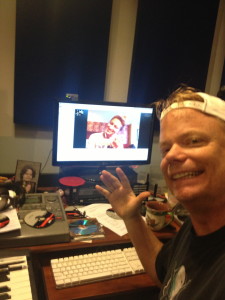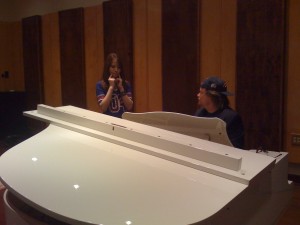
WHAT’S THE MAIN FOCUS OF YOUR TEACHING?
I’ve always been considered more of a technique teacher, but I definitely appreciate the marriage between good technique and the ability to emote, to create a dynamic stage character. Now I’d say it’s a 60-40 combination of those two. For those who are skilled in the performance area, my focus is mostly on getting the mix-smoothing the transitions, or bridges, of the voice.
WHAT’S ALL THIS TALK ABOUT VOCAL MIX? WHAT IS THAT?
The “mix” is a successful transition between registers; between chest voice and head voice. When it’s done according to my technique, the singer can belt a high note without straining, and go from softer, breathier to stronger, more focused without the voice “breaking”… the singer knows where the “break” in the voice is, but the listener can’t tell at all – it appears seamless!
HOW DO YOU ACHIEVE PROPER SUPPORT?
Two things: 1) the breath and 2) the mix. I keep an eye on the chest/diaphragm area to make sure the artist is getting the best breath they can ; the ribs expand as the chest lifts slightly…then I show them how to use as little air as is necessary by keeping their chest comfortably high, and singing with the same basic approach used for speaking. By getting more air and using less, they are guaranteed to get more control, sustain, etc… sometimes I’ll have them sit down or even bend forward during exercises to get more compression temporarily to the diaphragm area. There are lots of tricks.
WHERE HAS THE ULTIMATE VOICE TRAINING FOR SINGERS SOLD SO FAR?
In over 75 countries around the globe, but we get a lot of orders from the US, UK, Australia, Barbados, China, Japan, Canada, Italy, Germany, New Zealand, India, Brazil, Argentina, Hungary, Israel, Finland, Greece, France, Holland, Ireland, The Philippines, Spain…the list goes on.
HOW LONG DOES IT TAKE TO LEARN TO “MIX”?
The concept can become clear in just one lesson, and I’ve had some clients, particularly pros, who achieve the coordination itself in just a few sessions. Then it’s just a matter of continually working throughout the exercises for a few months. The average singer that is new to training, however, will generally take up to a year, and the application has to be ongoing.
ONCE A PERSON HAS LEARNED ALL THERE IS TECHNIQUE-WISE, WHAT’S THE PLAN FOR MAINTENANCE?
Keeping the voice limber with a daily exercise workout, and remembering how to shape your vowels during performance.
It’s all in the program.
SHOULD EVERYONE SING THIS EXACT SAME WAY?
Yes and no…they need to know their limits and when it’s important to stick to what they know, but they need to be able to “cheat” a little for the sake of performance variety. You can’t let technique become style; technique is a means, not an end. If everyone did the exact same vowels the exact same way all the time, it would get pretty boring. They have to use the guidelines and apply them to their character; that which makes them unique.
HOW IMPORTANT IS IT TO BE UNIQUE?
Very!
HOW CAN YOU BE SO ENCOURAGING TO WOULD-BE SINGERS? AREN’T SOME PEOPLE JUST TERRIBLE SINGERS BY NATURE?
Yes, but why are they so terrible? We are all given an apparent level of the “gift” by our Creator, and yes, just like in anything, some people just really seem to have very little of it. But I have seen too many incredible things happen among those very people to be anything but encouraging, particularly among kids and teens. You just have to troubleshoot the problems, break them down and roll up your sleeves. Those who are willing to do the work vocally, spiritually, mentally-these people do incredible things; they make it happen. I’m just a guide.
HOW DO YOU KNOW WHO WILL BE GOOD AND WHO WON’T?
I’ve been blessed with a good gut feeling, but I can’t always be 100% certain when I first meet someone… however, there are things to look for. First of all, how well they hear pitch. Anyone who can match pitch accurately could (not can, but could) learn to sing for the commercial market, period. Second, what’s their personality like? Their self-image? Can they laugh outloud on command? Can they yell at me on command? Make silly noises? In other words, can they act? If I ask you to yell at me with energy and all you can do is squeak out some little cry or half-hearted yelp because you feel silly, that’s not a vocal problem. That’s a performance problem, and the voice will begin to improve significantly when the performance problem is tackled. It takes time sometimes, but it’s very doable. You have to be patient with a new artist.
SO THEN, YOU’RE SAYING ANYONE WHO HAS GOOD PITCH AND CAN “LET LOOSE” CAN LEARN TO SING WELL?
Anyone can improve, and everyone who applies these principles of good vocal technique and performance will improve, but to what degree is determined by their savvy, their coach/teacher and by their natural gift. If everyone could learn to sing well enough to land a major record deal, everyone would be doing it!! But there are some who will defy all anticipation and really blow me away. I’ll see it in one lesson…it wasn’t there last week and it’s there this week – a sudden turning point where I know it’s happening again, another potential star is being born, and they know it, too…I praise the Lord for those moments! And I’ve seen the opposite, too…all the talent, all the tools in place, but absolutely no desire; no spark.
WHAT’S YOUR FEELING ABOUT VOCAL COMPETITIONS?
I think they’re great for bringing up the performance level of the individual – he has 4 minutes to give the audience everything he’s got. In a perfect world, judging is based on a combination of singing, staging and originality, but it’s not a perfect world…too many judges know nothing about singing; they base everything on showiness…but even then, if it’s your show that holds you back from getting a trophy, that’s a good reason to be in the competition. It’s important for the teacher and the artist to keep the trophy in perspective-the competition is only a means, not an end. It’s a means to improvement, and that’s all. To be your own personal best is the only goal – the trophy is just a frame of reference. A lot of teachers base their business on competitions. The more trophies, the more signups (it’s hard for parents to know exactly what to look for in a teacher), so the teachers get this “win at all cost” attitude, and they put the pressure on the students. It’s sad, because the goal is distorted, and the individual gets the wrong message… the competition becomes more important than the art. I heard one teacher quoted as saying to a student after a heartbreaking loss, “Well, you’ve done it to me again.” The teacher was referring to the fact that the student panicked and lost her vocal balance, but the key word here is “me.” The student didn’t do anything to the teacher, but that was the message…”it’s not just your loss, it’s my loss.” If it’s not about the student, what good is it doing? I won’t use that pressure, and I honestly think that’s part of why my peeps win these things so much.
WHAT ABOUT THE SINGING REALITY SHOW COMPETITIONS?
Those aren’t really competitions; it’s more like casting… the top 10 are never the 10 best that they’ve seen necessarily; there’s alot more involved in the casting of those shows. That being said, mah girl Jessica Sanchez ROCKED American Idol last season; she is a really great singer, technically and otherwise…
WHAT ADVICE DO YOU HAVE FOR YOUNG TEACHERS OF SINGING?
Young and old, the advice is the same –
1) Put your students first…stay on top of what’s going on in music, and if you’re not up on popular music pedagogically, don’t take students who want to learn it. If you want to learn about my technique, call me! I’ll get together with you, and then with your students in a workshop format.
2) Dedicate yourself to the task; don’t do it as a fallback to your own performing career. Only with total dedication can you truly devote yourself to the task and get it done. The exception to this is those performer/teachers who are well plugged in to a higher level of singing success, and take on only a few students at a time in hopes of bringing them up. If they’re good teachers, this can be a great situation for the student…remember, your students are the bottom line!
3) Don’t rely on your own voice as your only frame of reference, and don’t try to make your students do things the way you would do them, just because you would do them that way. (I’m talking about phrasing, improv, creative ideas)
Remember, they are artists; treat them as such. This seems like a no-brainer, but I’ve seen teachers that really crush the soul out of their students’ work by picking on unnecessary things…let them play; let them create, and yes, let them be wrong, too! Then step in and do your stuff; let them see the difference.





